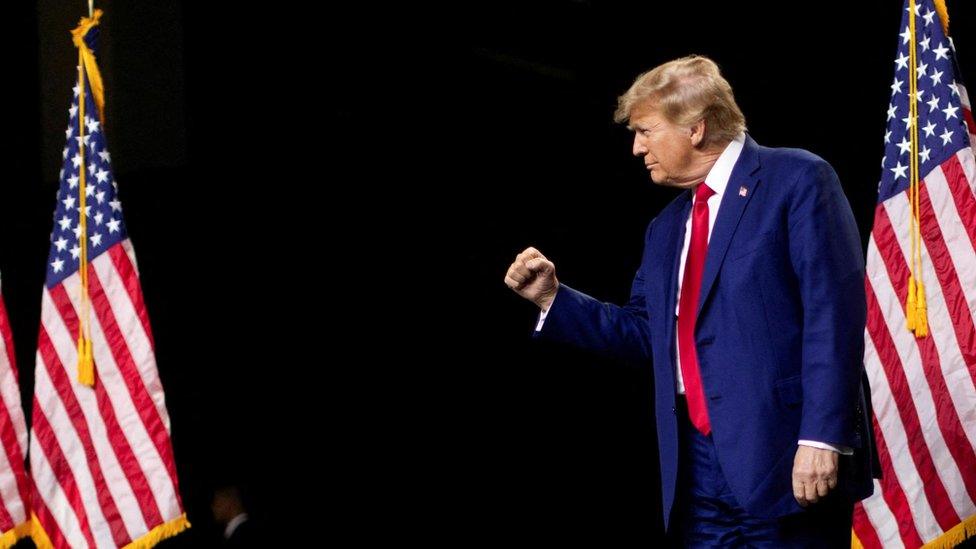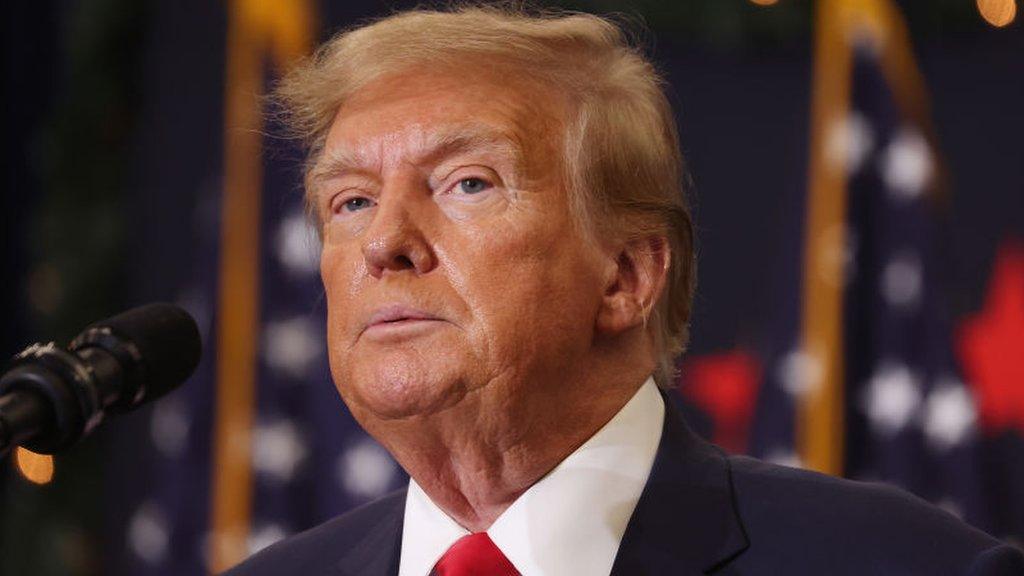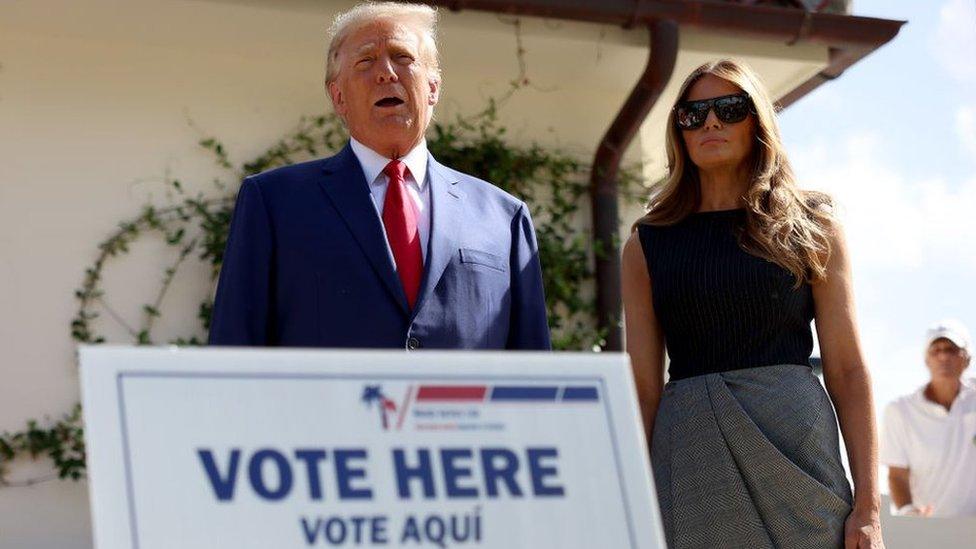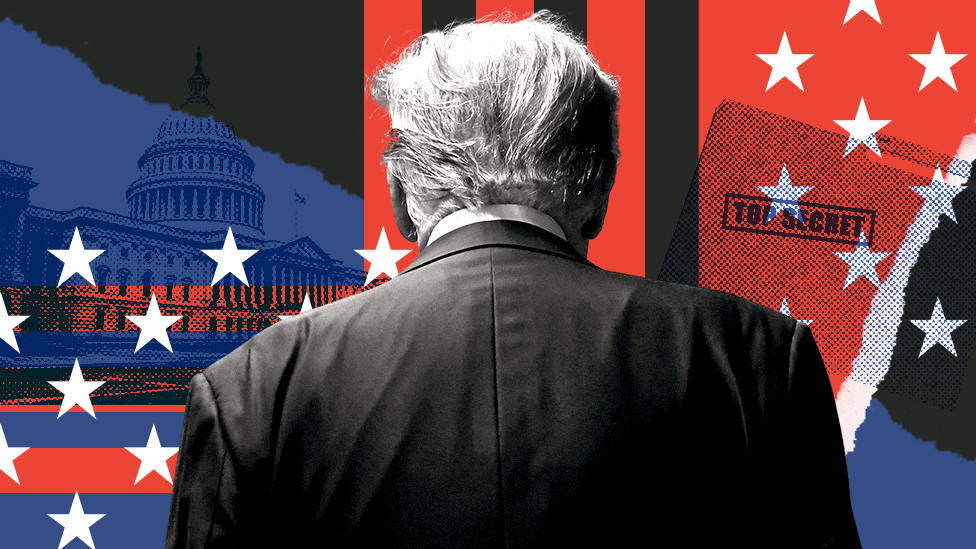Can Donald Trump still run for president after Maine and Colorado rulings?
- Published

Mr Trump faces several legal challenges heading into the 2024 presidential race
Donald Trump has been disqualified from running as a presidential candidate in two states, Colorado and Maine. So what does it mean for next year's general election?
Mr Trump is the clear frontrunner to be the Republican nominee in November 2024 and challenge Joe Biden for the White House. His campaign described both decisions as "atrocious" and an "attempted theft of an election".
The top election official in Maine ruled the former president was ineligible to run because of his actions around the Capitol riot. Colorado's highest court issued a similar, unprecedented, ruling just days earlier.
But it is still uncertain whether Mr Trump's name will appear on the ballot when the two states pick their Republican candidate in the coming months, as both rulings are on hold while an appeals process plays out.
The US Supreme Court has said it will hear the Colorado case in February, with its ruling applying nationwide.
Why did Maine make this ruling?
Unlike in Colorado, where the state's Supreme Court ruled on Mr Trump's eligibility, in Maine it was decided by the top electoral official because of a quirk in its constitution.
Secretary of State Shenna Bellows, a Democrat, issued a 34-page ruling that said Mr Trump must be removed from its Republican primary ballot because of Section 3 of the 14th Amendment, external.
Section 3 disqualifies people who engage in "insurrection or rebellion" from holding federal office.
Her order said Mr Trump "over the course of several months and culminating on January 6 2021, used a false narrative of election fraud to inflame his supporters and direct them to the Capitol".
Ms Bellows, an elected official, was accused of making a politically motivated decision by the Trump campaign. She denied this and said it was "thorough and based on the rule of law".
Speaking to BBC News after her ruling, Ms Bellows said it was her duty to uphold election laws in her state, and that she hoped the "Supreme Court will settle this matter nationwide".
What happened in Colorado?
On 19 December, the Colorado Supreme Court said it found "clear and convincing evidence that President Trump engaged in insurrection".
It was the first time Section 3 had been used to disqualify a presidential candidate.
The lengthy 213-page ruling, external said Mr Trump's actions in the build-up to 6 January 2021 did constitute insurrection.
His lawyers had argued in Colorado that he should not be disqualified because he did not bear responsibility for the riot.
They also noted that Mr Trump has not been charged with inciting insurrection.
Can Donald Trump still stand in the 2024 election?
Yes. These rulings only apply to Colorado and Maine respectively.
Hours after Maine's ruling, California's elected secretary of state, a Democrat, ignored calls to remove Mr Trump from the state's Republican primary ballot - saying it was a matter for the courts. Michigan's top court this week declined to hear a case seeking to disqualify Mr Trump.
Mr Trump is far ahead of his Republican rivals so can still win his party's nomination without competing in Colorado or Maine.
In the US, the two main parties nominate a presidential candidate by holding a series of state primaries and caucuses that begin in January.
In terms of the general election, in both states, Joe Biden won against Donald Trump in 2020 by a wide margin, and it is unlikely that Mr Trump will need to win the states to enter the White House once more.
What happens next?
The US Supreme Court has confirmed it will intervene to offer a ruling that would apply nationally.
That's because the Colorado Republican Party and Donald Trump himself appealed the state's ruling to the Supreme Court.
The top US court decided on 5 January that it would fast-track the case, and hear arguments at some point in February.
Mr Trump's name will remain on the ballot in Colorado until the Supreme Court makes a ruling.
The Maine ruling is also on hold pending a legal appeal in the state's courts. Any decision by the US Supreme Court will supersede this and apply nationally.
The US justices will have to consider the legal arguments which will take time, but they will be under pressure to decide before the Colorado and Maine primaries on 5 March, the so-called Super Tuesday when the greatest number of states hold ballots.
The balance of that court has shifted to more conservative in recent years, thanks in part to three justices who were appointed by Mr Trump when he was president.
Almost everything about the situation is unprecedented, leaving lingering questions about how this may affect the general election.
Maeva Marcus, the director of the Institute for Constitutional Studies at George Washington University, says the same "rationale" behind the Colorado ruling that disqualified Mr Trump from the primary ballot would "hold for the general election".
But it's too early to say what will happen in the general election in November until the issue works its way through the courts, she said.
Where do legal experts stand on this?
There are two key legal issues to consider.
One is whether Mr Trump's actions in the build-up to the storming of the US Capitol amount to insurrection.
The other is whether the office holders that Section 3 was aimed at barring should include the president.
A lower court in Colorado has already ruled that Mr Trump engaged in insurrection but the law did not apply to the office of the presidency.
The Colorado Supreme Court disagreed, and top legal scholars are divided on whether this law should apply to Mr Trump.
Lawyers for Mr Trump dispute that he engaged in insurrection and argue his remarks to supporters on the day of the 2021 riot were protected by his right to free speech.
What is the political impact?
Mr Trump's campaign said the latest ruling was another example of the justice system being used to persecute him.
But there could be wider implications for the general election.
Dozens of other US states have similar lawsuits trying to bar Mr Trump from running, and the decisions in Colorado and Maine could make it more likely some of them succeed.
If Mr Trump was stopped from running in a state where he and Mr Biden are neck-and-neck, that could be critical in a presidential race that is expected to be closely fought.
The Supreme Court stepping in will ensure there cannot be a patchwork of different rules on eligibility across the states.

More on the 2024 US election
Explained: A simple guide to the US 2024 election
Republicans: Who are the challengers to Trump?
Policies: What a Trump second term would look like
Voters: 'It's like 2020 all over again - with higher stakes'

- Published6 January 2024

- Published8 February 2024

- Published28 August 2024
